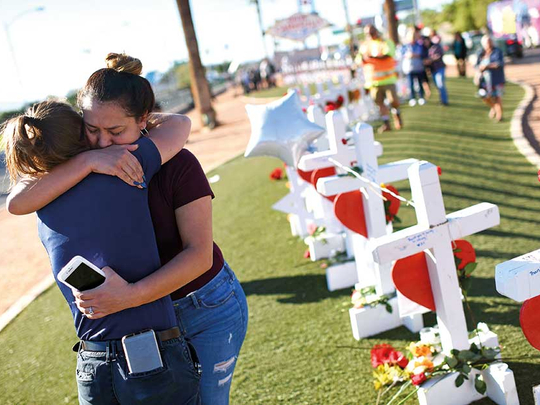
Las Vegas: Still unable to identify a motive five days after the massacre of 58 concertgoers, local and federal officials sounded increasingly desperate for leads on Friday, announcing plans to erect billboards with the message, ‘If you know something, say something.’
“There are still a number of people out there that know that something looked out of place,” said undersheriff Kevin McMahill of the Las Vegas Metropolitan Police Department. “Someone may have been acting suspiciously that night, or in the years prior, the months prior. Someone that may have seen something or knows something.”
Aaron Rouse, special agent in charge of the FBI office in Las Vegas, said billboards would be set up around Las Vegas area, to “reach as many people as we possibly can,” seeking tips about the gunman. “We have not stopped, we will not stop, until we have the truth.”
McMahill said on Friday, “we have no credible information to report to you, as to motivation.”
“We have looked at everything, literally, to include the suspect’s personal life, any political affiliation, his social behaviors, the economic situation, and any potential radicalisation that so many have claimed,” he said. “We’re also aware, of course, that Isis has repeatedly claimed responsibility, which today I can tell you that we have no known nexus to,” he said using an alternative name for Daesh.
As for whether the gunman, Stephen Paddock, had any help, the undersheriff said investigators were “very confident” there was not another gunman in the room, but that they still could not rule out that someone else knew of the attack.
“There’s voluminous amounts of video from many different locations” in the hotel, he said. “We have reviewed it, and we have not located any other person that we believe to be a suspect at this point.”
Investigators have not found a manifesto or signs that Paddock held extremist views. The FBI took Paddock’s computers and cellphones to its laboratory in Quantico, Virginia, for review, law enforcement officials said. Agents interviewed his girlfriend, Marilou Danley, in an attempt to determine his mental state at the time of the shooting, but Sheriff Joseph Lombardo of the Las Vegas Metropolitan Police Department said he was “not at liberty to say” what information had been learned.
Of course, investigators could at any time come across evidence that reveals Paddock’s thinking, Lombardo said on Thursday. “I’m pretty confident we’ll get there,” he said.
Though Paddock had explosives and chemicals that can be used in bomb-making in his car, “it did not resemble an IED,” or improved explosive device, McMahill said. Later, speaking on CNN, he clarified, “I believe he certainly had nefarious intent with that material,” but he did not know what that intent was.
The possibility that Paddock, 64, who had no evidence prior criminal history, was suffering from mental illness “is another aspect of the investigation we’re keenly interested in, and we continue to investigate that,” McMahill said.
A note Paddock left on a table inside his suite at the Mandalay Bay Resort and Casino had numbers written on it, Lombardo said in an interview. He said the authorities were trying to determine what the numbers meant, but the sheriff said the document was not a suicide note.
Investigators are looking into a large sum of money Paddock transferred to his girlfriend, Marilou Danley, in the Philippines, shortly before the attack.
Danley, who was born in the Philippines, said in a statement on Wednesday that Paddock wired her the money so that she could buy a house for herself and her family. She said she feared it meant he was breaking up with her. Some media reports have put the amount of the transfer at $100,000.
Officials at the Philippines Anti-Money Laundering Council and the National Bureau of Investigation declined to comment on whether they were looking into the transaction.
Other Philippine officials, who requested anonymity because they were not authorised to discuss the subject, said that any overseas transfer of more than $10,000 was supposed to be flagged for review but that few were actually examined.
The volume of money transfers is so big, they said, that only questionable transactions or those involved in a crime are investigated. Even a transfer of $100,000 would not have raised any eyebrows, said a former US law enforcement official who has worked in the Philippines. About 10 million Philippines citizens live overseas and send home more than $2 billion a month, according to government figures.
Paddock took two trips to Manila in April of 2013 and 2014, said Antonette Mangrobang, a spokeswoman for the Philippine Bureau of Immigration. Both trips coincided with his birthday on April 9 and each lasted less than a week.












